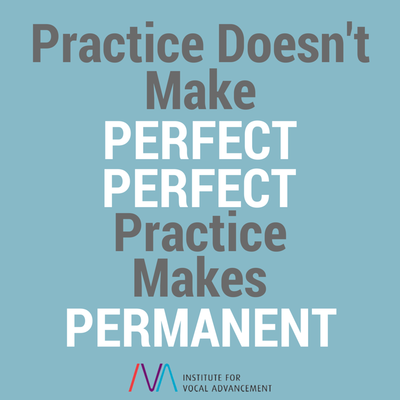Have you ever struggled to do your Singing Practice? Sometimes life, circumstance and busyness can get in the way of your perfect practice at home.
From time to time you may experience a struggle to get your singing practice done.
Understanding why we practice can help.
Have you ever wondered how someone can go from being an average singer, to a successful one? Or how an average sportsman, become a great one?
The answer is in practicing. Practicing and repeating an action until it becomes second nature to us. Another way to describe this is ‘muscle repetition’. Just like an elite athlete spends many hours behind the scenes perfecting their technique, a singer needs to do the same. This singer will then have confidence in their voice, knowing it will perform as they expect it to. This equates to freedom, skill and joy when performing live.
In the process of practice, you’ll discover your voice, find out what it capable of, improve your technique, build a stronger voice, improve your singing ability and help to achieve the songs you are wanting to sing.
I’ve created 9 tips to help you to get your singing practice done.
ENVIRONMENT
1. Work out ‘who’ you are.
What’s that got to do with it, you might ask?
Some singers practice in the morning, some during the day and some at night. We need to know what suits us best.
Are you a morning person, a day person or a night person? Each of us are more efficient at different times of the day. You’ll be more energised and motivated If you can find this time and slip your practices in then.
A student of mine used to do her singing practice at about 6:30am in the morning, after her gym workout (impressive huh!). She knew she was a morning person, set aside the time for practice and improved a great deal over the time she was having lessons – because she was so consistent.
Which one are you? Morning, Day? Night? Find out who you are.
2. Finding Time.
First: When do you have more time? Before work, on your lunch break, just before dinner?
What works best in your timetable? If you wait until 9pm to do your practice, then you probably won’t. You’ll be too tired and not able to focus. You may also not be in the good books with your housemates. (or even neighbours).
Earlier in the day is probably best, but knowing what works best in your schedule will be a step towards finding the best time to practice. We are all different and all function differently. What works for ‘you’?
Then: put the time in your diary, write it on the fridge or put a reminder into your phone
3. Your Surroundings

Your surroundings are important for effective practice.
Do you have a place set aside to practice, your own ‘Singing Space’? Most people use their bedroom or spare room/office, however some singers do their practice: in the bathroom (great acoustics), cleaning the house, whilst cooking dinner and in the car. (all true stories).
My suggestion is to set aside a specific place where you have the facilities to do your singing practice.
• a quieter place, that’s clean (helps with keeping a clear head), inspiring, (e.g. is there a view, a cool poster, your other music instruments?) and YOUR Space.
• facilities to play your mp3 file from your lesson (computer, music system, TV).
• facilities to play the song you are working on (same as above).
• a notebook to write any reminders, song ideas or quick thoughts about your voice.
If you live with housemates or family, you may need to be aware of their needs. It might be helpful to try to do your practice when they are – i.e. not home, not watching their favourite TV or doing their homework next door.
They may have some initial chuckles amongst themselves if they can hear you doing your practice, but they’ll soon get over it and even come to admire your dedication.
INSPIRATION
4. Plan of Attack

Having a goal is important for your singing practice. What am I working on today?
Usually at the end of your lesson you will receive a quick summary of what we did in the lesson and what to focus on during your exercises.
Perhaps it may help to write down what to focus on. Keep this in view while you are practicing.
Also, do you have long term goals? What are you working towards? Is your singing practice going to get you closer to your goals? Large goals can seem daunting, but once broken into goals for: this week, this month, the next 3 months, those goals are in bite size pieces that you can achieve – today.
5. Being Inspired
Take a moment to be inspired. Create a playlist of your favourite singers to listen to.
Before starting your practice, play ‘one song’ or a youtube clip of your favourite artist or song, to remind yourself of what you are working towards.
Playing this song will also take your mind off everything else that’s been going on and will give you a break and allow you to focus on the task at hand.
6. Practice with Direction.

Your Singing Lessons provide you with direction and what to practice. You have your very own Vocal Coach to help you. You’ve heard the saying “Practice Makes Perfect” Actually I believe that “Practice Makes Permanent”. Make sure to do your practice, knowing you are practicing the right way.
HELPFUL TIPS
7. No Songs! (what?)
Don’t allow yourself to sing a song until you’ve done your practice. This is a rule I set myself in the early days. If I’d feel like having a sing or exploring a new singer or new song, I wouldn’t allow myself to sing a song until I’d done my practice. The bonus was that once I got into the song, my voice was sounding better, warmed up and ready to go. Singing the song was even more rewarding.
8. Uh Oh. – it’s a bad singing day

Yes, we all have bad singing days, where the voice feels like it has a mind of it’s own and is less responsive. One day it can be great and the next ‘what’s happened to my voice??’ (you’re not alone in this one).
My suggestion: it’s not ok to ‘not’ practice, but be kind to yourself. On these days, find your favourite exercises and run through them. You are still exercising your voice, moving forward and working towards your goals. More than likely your voice will be different tomorrow. Don’t give up on it, just ‘be kind’ to it.
NOTE: if you are feeling sick, or your throats hurts when you sing/talk or swallow, then this is a day where singing is not a good idea. Just like we don’t run or jog with a broken leg, your voice is telling you it needs recovery time.
9. Make It Realistic.
If the goal of practicing seems too big, break it down into smaller pieces. As mentioned before, the big goal can seem ‘too big’, but we don’t have to do it all today. Today we are tackling ‘today’s’ goal. Today’s goal might be to go through our lesson for 20 minutes and pick a new song to work on. Much more achievable!
Some ideas:
• practice some of your exercises earlier in the day and then finish the remainder later.
• practice doesn’t have to be for a long period of time, but can be effective if it’s a shorter period of time where you are very focused on what you are doing.
• I don’t encourage people to practice in the car as an on-going habit, but as a one-off it can keep you on track.
• if you are travelling or away from home, there is software that you can use. I quite like VocalizeU, an app that provides basic singing scales to sing to. This program is handy if you don’t have access to your regular practice resources.

In summary, finding out what environment suits you best, what inspires you and what you are working towards will provide inspiration to continue practicing. Be the elite athlete and keep working towards your goal.
You can do it!
About Melanie de Sousa
Melanie de Sousa has been a full time Singing Teacher in Geelong for 12 years and her aim is to help all singers to ‘Sing Confidently’ and ‘Sing Correctly’.
You can find Melanie on Facebook, Twitter and Google+
Share this Post
